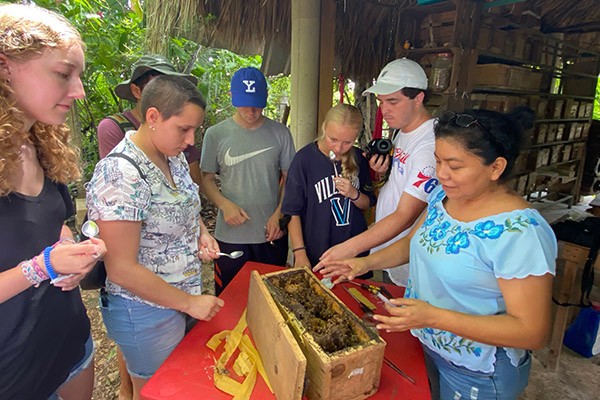New Study Abroad Program Teaches Sustainability from Indigenous Peoples’ Perspective

On the frontlines of major sustainability challenges are the Maya people—who are growing medicinal plants in botanical gardens, conserving the local bee population and optimizing natural resources for community-based tourism, among other sustainable practices. As part of a new study abroad program, Villanova students spent the summer alongside the Maya people in Merida, Yucatan, Mexico to study sustainability from their perspective.
“[Biologist and former Secretary of Environment and Natural Resources of Mexico] Victor Toledo reminds us that in order to effectively preserve the world’s biodiversity, we must also protect the diversity of human cultures,” says Raúl Diego Rivera Hernández, PhD, Department of Spanish. “The Maya people still live in their ancestral homelands, not only in parts of southern Mexico but also Guatemala, Belize and portions of Honduras and El Salvador. They continue to enrich their communities, using their cultural and natural knowledge to create more sustainable ways of living.”
Dr. Hernández teaches the course “Ethnoecology and Indigenous Sustainability in Yucatán” in the six-week study abroad program Spanish Language and Indigenous Sustainability in Merida, Yucatan, Mexico, which launched summer 2022. Immersed in the Maya culture, students learn the importance of traditional ecological systems and their potential for addressing local and global environmental problems with minimal environmental impact.
The interdisciplinary course provides an experiential learning opportunity for students with a variety of academic interests—from environmental justice issues, to environmental sciences, to Spanish or the social, cultural, political complexities of Latin American societies. The course culminated with a research paper, which each student could tailor their academic interests and career goals.
“This experience reinforced that I want to work directly with communities and create a positive impact through my work,” says Shealyn Murphy ’24 CLAS, who is double majoring in Environmental Science and Spanish Studies. In her paper, she explores how a bee species has sustained Maya culture and survived various environmental threats over the last several centuries.
“I was really interested in drawing a connection between environmental change and its impact on culture and tradition, and vice versa,” she says. “Indigenous populations currently serve as stewards to 80% of the world's biodiversity, which is just one reason why supporting diverse cultures is valuable in terms of sustainability.”
